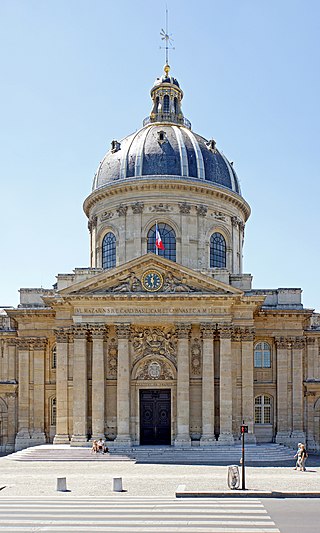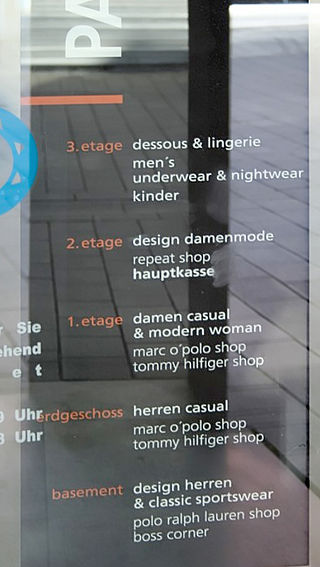Joual is an accepted name for the linguistic features of Quebec French that are associated with the French-speaking working class in Montreal which has become a symbol of national identity for some. Joual has historically been stigmatized by some, and celebrated by others. While Joual is often considered a sociolect of the Québécois working class, many feel that perception is outdated, with Joual becoming increasingly present in the arts.
Brunch is a meal, sometimes accompanied taken sometime in the late morning or early afternoon – the universally accepted time is 11am-2pm, though modern brunch often extends as late as 3pm. The meal originated in the British hunt breakfast. The word brunch is a portmanteau of breakfast and lunch. The word originated in England in the late 19th century, and became popular in the United States in the 1930s.

Quebec French, also known as Québécois French, is the predominant variety of the French language spoken in Canada. It is the dominant language of the province of Quebec, used in everyday communication, in education, the media, and government.

A loanword is a word at least partly assimilated from one language into another language, through the process of borrowing. Borrowing is a metaphorical term that is well established in the linguistic field despite its acknowledged descriptive flaws: nothing is taken away from the donor language and there is no expectation of returning anything.

The Académie Française, also known as the French Academy, is the principal French council for matters pertaining to the French language. The Académie was officially established in 1635 by Cardinal Richelieu, the chief minister to King Louis XIII. Suppressed in 1793 during the French Revolution, it was restored as a division of the Institut de France in 1803 by Napoleon Bonaparte. It is the oldest of the five académies of the institute. The body has the duty of acting as an official authority on the language; it is tasked with publishing an official dictionary of the language.
In linguistics, a neologism is any newly formed word, term, or phrase that has achieved popular or institutional recognition and is becoming accepted into mainstream language. Most definitively, a word can be considered a neologism once it is published in a dictionary.
A pseudo-anglicism is a word in another language that is formed from English elements and may appear to be English, but that does not exist as an English word with the same meaning.
Franglais or Frenglish is a French blend that referred first to the overuse of English words by French speakers and later to diglossia or the macaronic mixture of French and English.

Denglisch is a term describing the increased use of anglicisms and pseudo-anglicisms in the German language. It is a portmanteau of the German words Deutsch (German) and Englisch. The term is first recorded from 1965.
An anglicism is a word or construction borrowed from English by another language. With the rise in Anglophone media and the global spread of British and US colonialism in the 20th century and cultures in the 21st century, many English terms have become widespread in other languages. Technology-related English words like internet and computer are prevalent across the globe, as there are no pre-existing words for them. English words are sometimes imported verbatim and sometimes adapted to the importing language in a process similar to anglicisation. In languages with non-Latin alphabets, these borrowed words can be written in the Latin alphabet anyway, resulting in a text made up of a mixture of scripts; other times they are transliterated. Transliteration of English and other foreign words into Japanese generally uses the katakana script.
There are various lexical differences between Quebec French and Metropolitan French in France. These are distributed throughout the registers, from slang to formal usage.

Choux pastry, or pâte à choux, is a delicate pastry dough used in many pastries. The essential ingredients are butter, water, flour and eggs.
Canadian French is the French language as it is spoken in Canada. It includes multiple varieties, the most prominent of which is Québécois. Formerly Canadian French referred solely to Quebec French and the closely related varieties of Ontario (Franco-Ontarian) and Western Canada—in contrast with Acadian French, which is spoken by Acadians in New Brunswick and some areas of Nova Scotia, Prince Edward Island and Newfoundland & Labrador.
In typical usage, retard is a pejorative term either for someone with an actual mental disability, or for someone who is considered stupid, slow to understand, or ineffective in some way as a comparison to stereotypical traits perceived in those with mental disabilities. The adjective retarded is used in the same way, for something very foolish or stupid. The word is sometimes censored and referred to as the euphemistic "r‑word" or "r‑slur".
The Centre national de ressources textuelles et lexicales (CNRTL) is a French organisation which publishes linguistic data and information online.
Iel is a neopronoun in the French language intended as an alternative to the gender-specific pronouns elle ("she") and il ("he"). It has been adopted by the Le Robert dictionary but is not officially accepted by the Académie Française.




